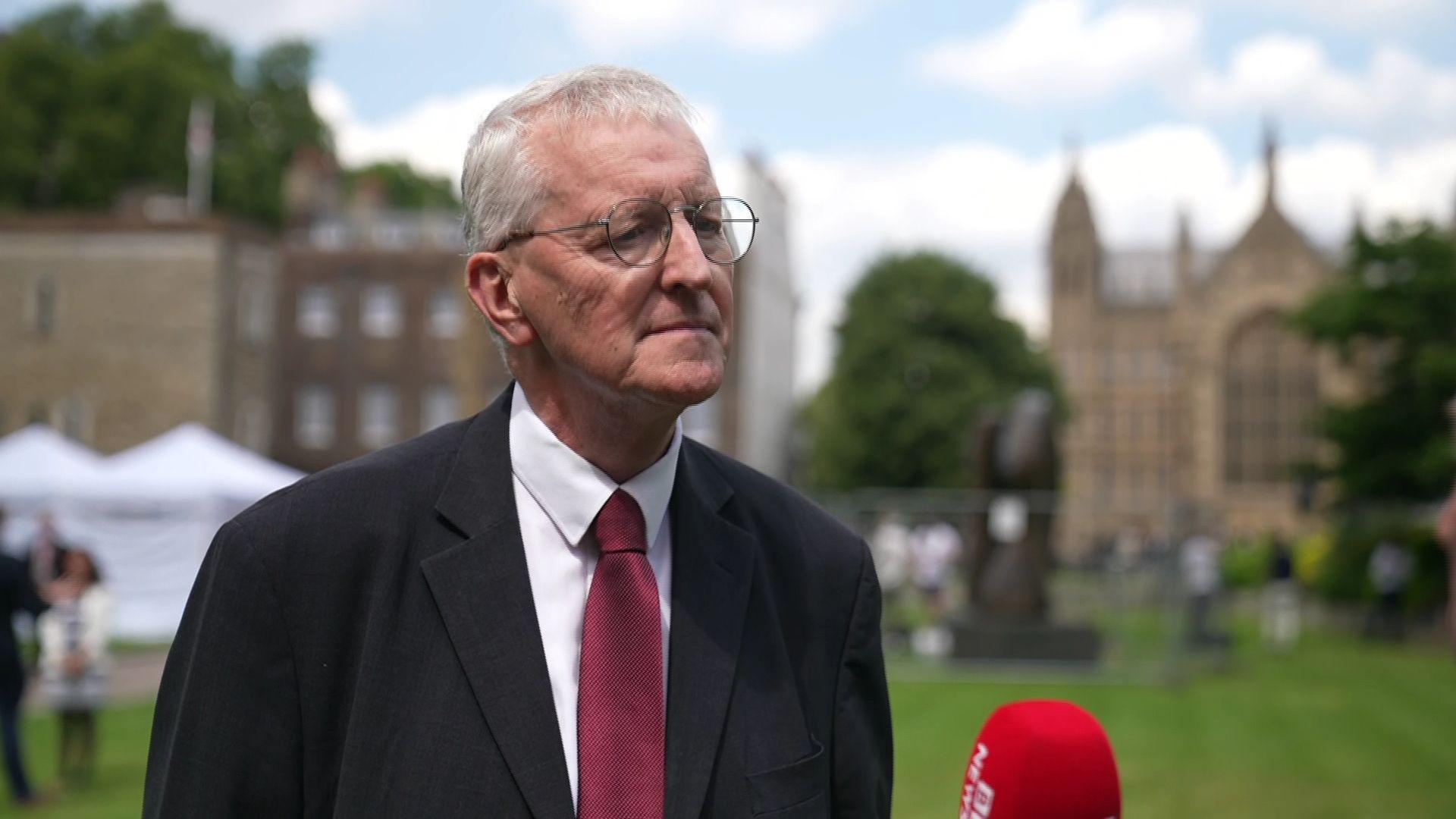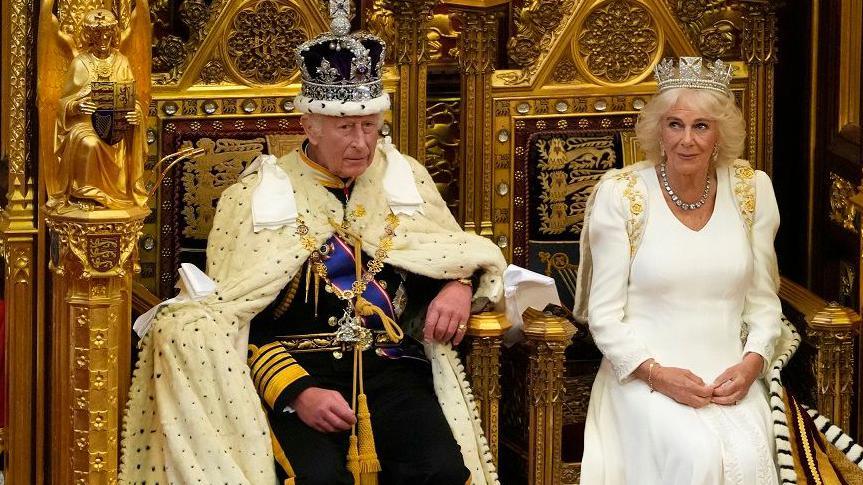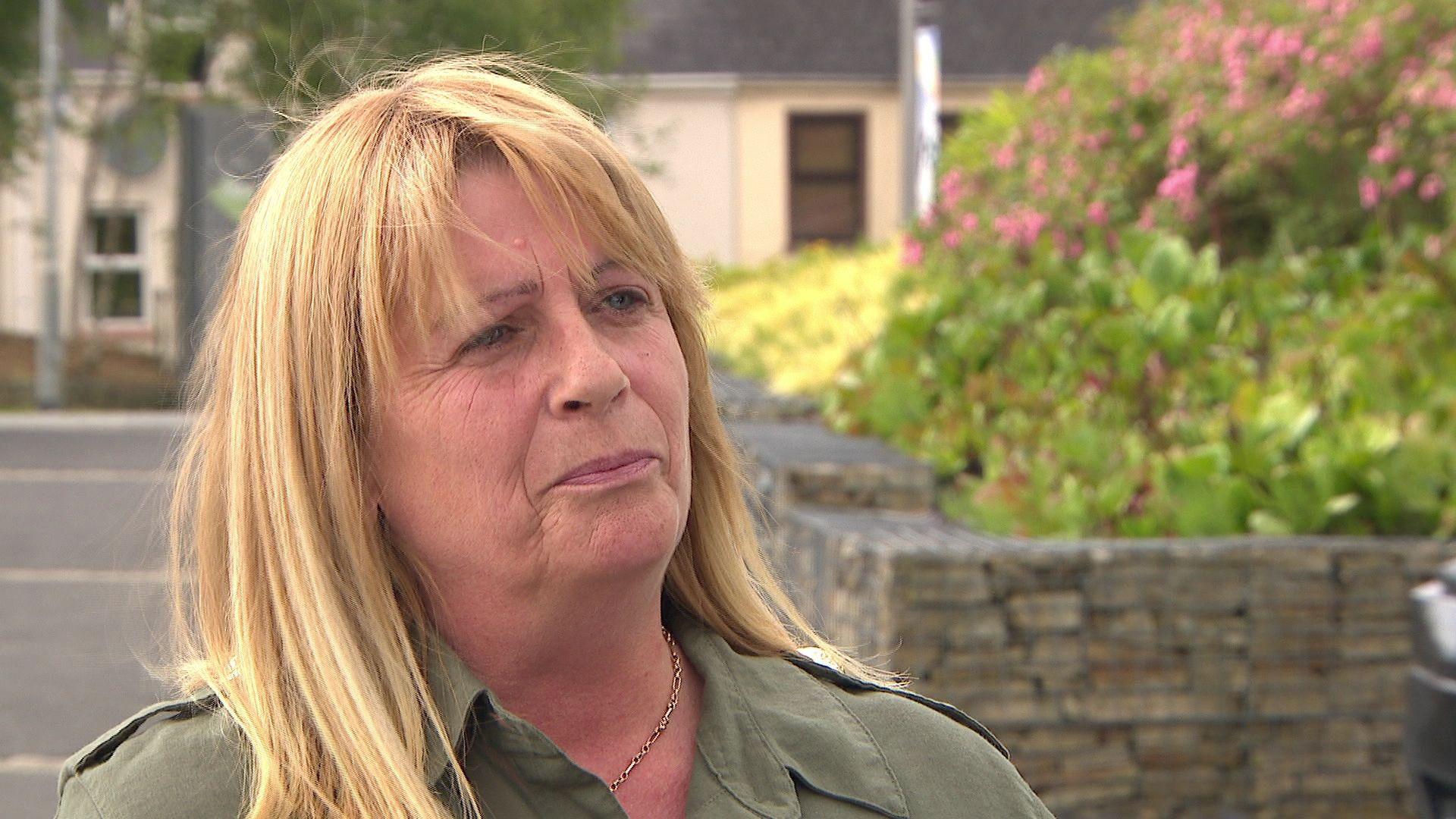Benn will not put timeline on repeal of Troubles act

Secretary of state Hilary Benn says the process is quite complicated
- Published
The secretary of state has refused to put a timeline on repealing and replacing the Legacy Act.
Hilary Benn said the government intended to do it "as soon as we can" as the process is quite complicated but he said, 'the commitment is very clear'.
The government repeated a pledge to repeal the Act in the King's Speech.
It is among the Labour Party’s legislative plans which have been outlined during the State Opening of Parliament.
The Legacy Act introduced a ban on inquests and civil actions related to incidents during the conflict in Northern Ireland known as the Troubles.
It also sought to offer a conditional amnesty for people suspected of Troubles-related crimes in exchange for co-operating with a new information recovery body.
This element was disapplied after a court ruled it breached human rights, following legal action by bereaved families.
Mr Benn said: "The legacy act does not have the support of any of the political parties and victims' groups in Northern Ireland and we are committed to repeal and replace it.
"It will mean getting rid of conditional immunity, it will mean working with the parties to restore civil cases and inquests and in particular those inquests which have been cut short by the May 1st deadline that the act brought them all to an end".
He said he had no plans to scrap the Independent Commission for Reconciliation and Information (ICRIR) but plans to reform how it works.
The ICRIR is headed by Sir Declan Morgan, a former lord chief justice of Northern Ireland.
"We need a process for information recovery and continuing investigation.
"I've said I'll be maintaining the independent commission I will want to reform the way in which its governance works but the aim is to get a process for dealing with these difficult questions of legacy that can command more support, they may not get universal support, but more support than the legacy act which has no support in Northern Ireland" he added.
Mr Benn said the success of the independent commission will depend on how it does its work and victims' families dealing with the commission will be the judge.
Conditional immunity provisions

King Charles and Queen Camilla at the opening of Parliament
In his speech, King Charles said: “In consultation with all parties, measures will be brought forward to begin the process of repealing and replacing the Northern Ireland Troubles (Legacy and Reconciliation) Act 2023.”
It followed the Labour Party pledging in its manifesto for the general election on 4 July to “repeal and replace” the legislation.
Under Labour’s plans, the government is expected to remove the conditional immunity provisions.
It also plans to reverse the ban on civil claims and allow Troubles-era inquests halted prematurely to resume.
But it does not intend to repeal the act in its entirety without first having a replacement in mind.
The government plans to “explore options to strengthen the independence” of the new body set up under the legislation, the Independent Commission for Reconciliation and Information (ICRIR).
It intends to consult with Stormont parties, the Irish government and communities in Northern Ireland on a way forward.
An ICRIR spokesperson said: "We will be continuing with our vital work of investigations which the government has made clear will remain.
"The announcement that conditional immunity will be repealed removes a significant concern for many victims, survivors and their families and the Commission considers that this clarity will provide reassurance."
How have the Northern Ireland parties reacted?

The act introduced a ban on inquests and civil actions related to incidents during the Troubles
DUP MP Carla Lockhart welcomed the repeal of the legacy legislation but said the "devil is in the detail".
"We will be speaking out on behalf of victims, and we will be pushing the UK government to push the Irish government to do more on legacy," she said.
"We are disappointed there wasn't more on the restoration of Northern Ireland's place in the United Kingdom because of the overreach of the protocol and the Windsor Framework so we will be working with our colleagues on the unionist benches to ensure our rightful place is restored."
Sinn Féin MP John Finucane told BBC News NI families had been provided with "hope that they will have their day in court."
"It’s to be welcomed," he added.
"Any government is always in a position where if they do have an ability to help families who have been campaigning, in some cases for over 50 years, then they must do that," he said.
SDLP leader Colum Eastwood said he was delighted to see the legacy act "binned" and described the repealing of the legislation as a "big victory for victims".
The Foyle MP said the act was "an anti-democratic piece of legislation which gave impunity to murderers and did nothing to bring about the reconciliation of people".
Ulster Unionist South Antrim MP Robin Swann welcomed the move but said "what really worries me is the timetable in regard to repealing that act and how soon it would be repealed because we have victims waiting not knowing where they stand.
"So, if the government is going to do this, they need to do it with speed and with consultation of parties in Northern Ireland."
The Alliance Party's Lagan Valley MP Sorcha Eastwood said she was delighted to see the repealing and replacing of the act commencing and added families "should never be denied avenues for justice".
Traditional Unionist Voice leader Jim Allister said it was "only a commitment to consult and bring forward something different, but we don't know what the something is".
Tánaiste (Irish deputy first minister) Micheál Martin said the move was "very welcome", adding that "the act as it stands is not fit for purpose".
Michael O’Hare, whose sister Majella was shot and killed by a British soldier in 1976, said: “This is an important day for families like ours, who thought we’d seen the door closed forever on these cases."
The South East Fermanagh Foundation (SEFF) say they have consistently been "opposed to the methodology of the Legacy and Reconciliation Act."
Kenny Donaldson, SEFF's Director said in a statement said that "we will be insisting that the approach taken now provides pathways for all victims and survivors including our constituency."
"The civil litigation process is all but closed off to the victims of Provisional IRA terrorism, so the key question will be; what is the new Labour Government proposing around meeting this deficit?" he added.

Martina Dillon says she welcomes the planned changes
Martina Dillon, the widow of a hotel doorman shot by loyalists in Dungannon in 1997, has welcomed Labour’s planned changes to the Legacy Act.
It means an inquest into her husband Seamus’s murder will now resume.
It closed after three days of opening and was one of almost 40 troubles inquests which missed the 1 May deadline for completion imposed by the act.
Mr Dillon, who had served a life sentence for an IRA murder, was shot by the Loyalist Volunteer Force (LVF) outside the Glengannon Hotel.
Mrs Dillon said: “To hear Labour is overturning this means an awful lot, not only for me but everybody else in my position.
“It is like winning the pools. Everybody is entitled to an inquest.”
Council of the regions
The government also outlined plans in the King’s Speech to establish a new “council of the nations and regions”.
King Charles said this would “renew opportunities for the prime minister, heads of devolved governments and mayors of combined authorities to collaborate with each other”.
It is part of efforts by the government to “strengthen” its work with the devolved governments in Scotland, Wales and Northern Ireland.
The King also said the Labour government would seek to “reset the relationship with European partners”.
It will “work to improve the United Kingdom's trade and investment relationship with the European Union".
Analysis: Julian O'Neill, crime and justice correspondent
We didn’t really learn anything new today about Labour’s legacy plan.
Stage one will involve no return of the conditional immunity clause, as well as lifting bans on legacy inquests and civil actions.
Part two – a replacement act – will involve detailed negotiations and doubtless take time.
How long? Who knows.
The legacy body created under the act, the ICRIR, looks like it figures in Labour’s plan in some kind of adjusted form.
It has talked of strengthening its independence, not abolishing it.
The ICRIR meantime is adopting a business as usual approach – it will not stop what it’s doing while things are reworked.